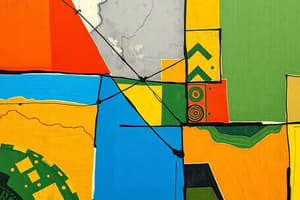Podcast
Questions and Answers
What concept involves dividing history into distinct periods based on significant events or changes?
What concept involves dividing history into distinct periods based on significant events or changes?
- Bias
- Context
- Periodization (correct)
- Causality
Which of the following describes the difference between primary and secondary sources?
Which of the following describes the difference between primary and secondary sources?
- Primary sources are analyzed interpretations, while secondary sources are original records.
- Secondary sources provide direct insight, while primary sources offer synthesized perspectives.
- Primary sources are original records, while secondary sources analyze those records. (correct)
- Secondary sources are firsthand accounts, while primary sources are derived interpretations.
What is essential for accurate interpretation of historical events?
What is essential for accurate interpretation of historical events?
- Anecdotal evidence
- Rhetorical analysis
- Contextual understanding (correct)
- Bias recognition
Which historical period is typically defined as spanning from the fall of the Western Roman Empire to the Renaissance?
Which historical period is typically defined as spanning from the fall of the Western Roman Empire to the Renaissance?
What term refers to the systematic approach historians use in conducting research?
What term refers to the systematic approach historians use in conducting research?
Flashcards
Periodization in History
Periodization in History
Dividing history into distinct periods based on significant events or changes.
Historical Causality
Historical Causality
Examining cause-and-effect relationships in historical events, looking at related factors.
Historical Context
Historical Context
Analyzing events within their specific historical, social, political, and economic settings.
Primary Source
Primary Source
Signup and view all the flashcards
Historical Bias
Historical Bias
Signup and view all the flashcards
Study Notes
Historical Periods and Concepts
- History encompasses the totality of past events, human activities, and experiences, ranging from prehistory to the present.
- Historians study and interpret this information, often focusing on specific periods, regions, or themes.
Key Historical Concepts
- Periodization: Dividing history into distinct periods based on significant events or changes. Examples include the Paleolithic, Bronze Age, or the Renaissance. The choice of dividing periods is often debatable and may reflect cultural or disciplinary biases.
- Causality: Investigating cause-and-effect relationships within historical events. Historians frequently examine interconnected factors that shaped a given period.
- Context: Analyzing events within their specific historical, social, political, and economic environments. Contextual understanding is essential for accurate interpretation.
- Bias: Recognizing subjective perspectives within historical accounts. Historians must continually question their sources and acknowledge potential biases.
- Primary Sources: Original records of historical events, such as letters, diaries, documents, and artifacts. They offer direct insight into the past.
- Secondary Sources: Analyses and interpretations of primary sources by historians. These sources provide context and often synthesize multiple perspectives.
- Historical Methodology: The systematic approach taken by historians in conducting research, including source criticism, analysis, and interpretation.
- Historical Narrative: The way historians structure and present their interpretations of the past. Historical narratives may differ depending on the historian and their perspective.
Historical Periods
- Ancient History: Covers civilizations and societies from the earliest known records through the classical periods of ancient Greece and Rome, and beyond.
- Medieval History: Encompasses the Middle Ages, a period generally spanned by the fall of the Western Roman Empire to the Renaissance.
- Modern History: Covers the events and developments from the Renaissance through the present day. Subdivisions, such as the Early Modern and Late Modern periods, are also common.
- Early Modern Period: This period bridges medieval and modern history, marked by significant developments in Europe and the wider world, including humanism, the Renaissance, and the Reformation.
- Late Modern Period: Refers to the period from the end of the Enlightenment to the present. This is a crucial period of industrialization, globalization, and scientific advancement.
Historical Schools of Thought
- Historical Materialism: Emphasizes the role of economic factors, class struggles, and material conditions in shaping historical events.
- Feminist History: Examining how gender has shaped and been shaped by historical events. Often highlighting women's roles, experiences, and agency that have been overlooked or marginalized.
- Postcolonial History: Analyzing the legacies of colonialism and its impact on colonized societies.
- Postmodern History: Questioning grand narratives and traditional historical interpretations, emphasizing the multiplicity of perspectives and subjective interpretations of the past.
Historiography
- Historiography refers to the study of historical writing itself. It examines how historical interpretations have changed over time, and the different methodologies, perspectives, and biases employed by various historians.
Challenges in Studying History
- Fragmentary Evidence: Historical record is often incomplete, biased, or lost. This necessitates careful selection and analysis of available sources.
- Accessibility: Many historical records may be physically distant or inaccessible due to language barriers or restrictive policies in specific archives..
- Interpreting Subjectivity: Historians must critically evaluate their own perspectives in relation to historical subjects, acknowledging personal biases.
- Changing Perspectives: Historians' understanding of the past evolves over time through new discoveries, methodologies, and cultural shifts.
Significance of Studying History
- Understanding how societies have developed, adapted, and changed. This allows us to understand patterns in human behavior.
- Recognizing the roots of current issues, such as social inequalities, geopolitical conflicts or environmental consequences.
- Appreciating cultural diversity across different periods and societies.
- Fostering critical thinking and analysis skills through engagement with historical content.
- Creating informed narratives and analyses about the past, which help us form informed perspectives about the present and future.
Studying That Suits You
Use AI to generate personalized quizzes and flashcards to suit your learning preferences.
Description
Test your knowledge on the major periods in history and essential concepts that historians use to interpret events. This quiz covers periodization, causality, context, and the recognition of bias in historical accounts, offering insight into the complexities of historical study.




